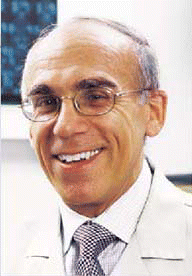Dr. Walker: Does he ever have a good night with CPAP? When he is able to wear it, does he have a good night, does he notice any benefits? That’s one of the first things I will ask. If they come in totally disgusted with CPAP, I might try something else, but if they are still open minded, I would retry CPAP and work on the nose before going into surgery.
Explore This Issue
September 2006Dr. Senior: In a situation like this I will get into a discussion about nasal issues with the patient. If we fix the septum, that might offer some improvement and make CPAP more effective. It’s always a question mark, though. In my clinical experience it’s about a 50-50 shot, but there are certainly individuals who will see significant benefit. I always like to look at hyperthyroid issues and reflux issues as well.
Dr. Friedman: When a patient comes in like this, they have to understand that we can offer them help, but it might not be ideal. If they are committed to getting rid of CPAP, then I would talk to them immediately about two surgical procedures-one directed at the nose and a second one directed at the palate and, in both procedures, I would address the tongue base with radiofrequency reduction. If I’m committed to a plan of surgical correction, not only would I include the septum, but the nasal valve is also crucial to treat.
Dr. Woodson: More and more I do the nose first. Even if, in general, they’re doing okay with the CPAP, we find that they do much better when we’re more aggressive at treating the nose. Probably 95% of my nasal surgeries are done under local anesthesia and the recuperation, even with severe apnea patients, is just so rapid that many of these people can even go home the same day.
I also use positional therapy a lot; it helps their reflux too. Sometimes, if you just elevate the head of the bed 12 inches or so, you might be able to drop the CPAP rate to 2 to 3 cm and they can now tolerate it.
I do endoscopy on every patient; any patient with an airway issue, snoring or otherwise, deserves full endoscopy. – -Michael Friedman, MD
Dr. Walker: I use positional therapy a lot as well. Until I can get a sleep study on them, I tell them they can’t even sleep in bed-they have to sleep in a recliner. And for people who aren’t tolerating CPAP and are waiting for surgery, I tell them they are not allowed to sleep in bed, and many of them really do better. You even see that in the OR. If someone is obstructing after they’ve been extubated, just sit them up, lean them forward, and they start breathing. Positioning is huge.
Case #2
Dr. Woodson: A 56-year-old, non-obese, postmenopausal female comes in complaining of poor sleep. She wakes up a lot; she had a sleep study and the sleep doctor put her on CPAP. She failed CPAP and says it’s the worst thing that she’s ever had any experience with and, in fact, made her problem much, much worse. She does snore, but she’s not really complaining about that; she’s just tired and not feeling well.

Leave a Reply